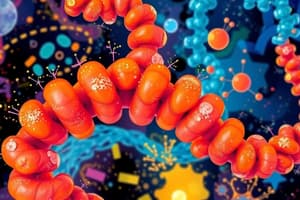Podcast
Questions and Answers
What is the main role of enzymes in facilitating biochemical reactions?
What is the main role of enzymes in facilitating biochemical reactions?
- Increase the activation energy required for reactions
- Create new biochemical reactions
- Speed up the metabolic processes
- Decrease the activation energy required for reactions (correct)
Which of the following best describes enzyme structure?
Which of the following best describes enzyme structure?
- Composed of one or more polypeptide chains with active sites (correct)
- Linear arrangement of amino acids
- Enzymes do not have specific substrates
- Globular proteins with no folding
Which type of enzyme catalyzes the transfer of functional groups in biochemical reactions?
Which type of enzyme catalyzes the transfer of functional groups in biochemical reactions?
- Oxidoreductases
- Isomerases
- Hydrolases
- Transferases (correct)
What is the function of a cofactor in enzymes?
What is the function of a cofactor in enzymes?
Enzyme inhibition involves:
Enzyme inhibition involves:
What is the key role of the active site in enzymes?
What is the key role of the active site in enzymes?
What is the study of how enzymes catalyze reactions and how the reaction rate is affected by changes in substrate concentration, temperature, and other factors?
What is the study of how enzymes catalyze reactions and how the reaction rate is affected by changes in substrate concentration, temperature, and other factors?
Which equation relates the reaction rate to the concentration of substrate and the enzyme's maximum reaction rate?
Which equation relates the reaction rate to the concentration of substrate and the enzyme's maximum reaction rate?
What type of enzymes have multiple active sites on different protein subunits and can be affected by allosteric inhibitors binding to any active site?
What type of enzymes have multiple active sites on different protein subunits and can be affected by allosteric inhibitors binding to any active site?
What occurs when a molecule binds to an enzyme, reducing its activity?
What occurs when a molecule binds to an enzyme, reducing its activity?
Which of the following regulatory molecules can bind to enzymes at specific sites, altering their activity?
Which of the following regulatory molecules can bind to enzymes at specific sites, altering their activity?
Where can inhibitors bind to enzymes, affecting their activity?
Where can inhibitors bind to enzymes, affecting their activity?
Flashcards are hidden until you start studying
Study Notes
Enzymes
Enzymes are proteins that play a crucial role in facilitating biochemical reactions in living organisms. They are responsible for decreasing the activation energy required for chemical reactions to occur, speeding up reaction rates and enabling metabolic processes to occur at physiologically significant rates. Enzymes are highly specific and only bind to certain substrates for specific reactions, ensuring that the correct chemical reactions take place in the body.
Enzyme Structure
Enzymes are globular proteins that range in size from less than 100 to over 2,000 amino acid residues. They are composed of one or more polypeptide chains that are folded and bent to form a specific three-dimensional structure, including a small area known as the active site where the substrate binds. The active site's shape and charge properties enable it to bind to a specific type of substrate, ensuring enzyme specificity.
Enzyme Function
Enzymes catalyze a wide range of reactions, including oxidation-reduction (oxidoreductases), transfer of functional groups (transferases), breaking of bonds (hydrolases), forming new bonds (ligases), and isomerization (isomerases). They can be inactive until bound to a cofactor, which activates the enzyme, forming a holoenzyme. This complex facilitates the catalytic reaction by stabilizing the active site and providing an appropriate environment for substrate interaction.
Enzyme Kinetics
Enzyme kinetics is the study of how enzymes catalyze reactions and how the reaction rate is affected by changes in substrate concentration, temperature, and other factors. The rate of an enzyme-catalyzed reaction is described by the Michaelis-Menten equation, which relates the reaction rate to the concentration of substrate and the enzyme's maximum reaction rate.
Enzyme Regulation
Enzymes are regulated to ensure that they function optimally in different cells and under various conditions. Regulatory molecules, such as activators and inhibitors, can bind to enzymes at specific sites, altering their activity. Some enzymes, called allosteric enzymes, have multiple active sites on different protein subunits, and when an allosteric inhibitor binds to an enzyme, all active sites are affected, changing their activity.
Enzyme Inhibition
Enzyme inhibition occurs when a molecule binds to an enzyme, reducing its activity. Inhibitors can be reversible or irreversible, and their binding can occur at the active site or an allosteric site on the enzyme. Allosteric inhibition involves the substrate itself binding to an allosteric site, affecting the activity of other active sites on the protein subunits.
In summary, enzymes are essential proteins that play a vital role in facilitating biochemical reactions in living organisms. Their specific structure and function enable them to catalyze a wide range of reactions and adapt to various conditions through regulation and inhibition mechanisms. Understanding enzyme structure, function, kinetics, regulation, and inhibition is crucial for studying and manipulating these crucial biological molecules.
Studying That Suits You
Use AI to generate personalized quizzes and flashcards to suit your learning preferences.




